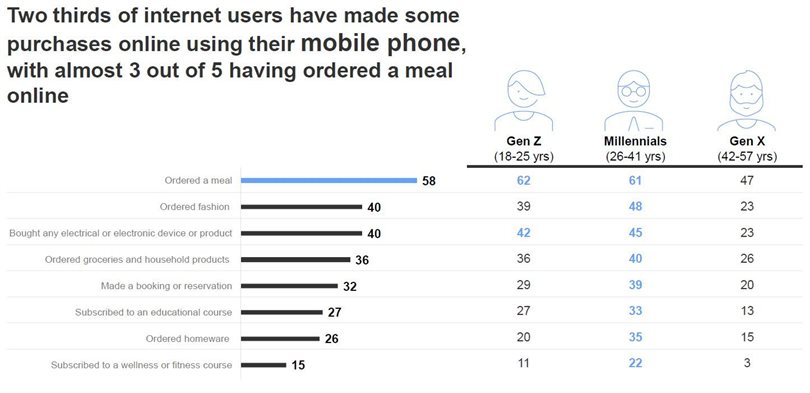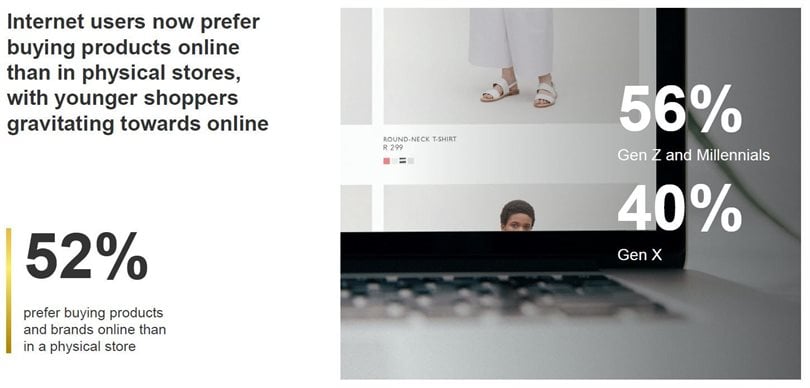Marketing to Millennials and Gen Z: Social selling beyond stereotypes

Future-focused companies have realised the need to create a customer-centric culture, with Kantar’s Global Monitor proving as many as 90% of CEOs already saw customer-centricity as essential for business success before the pandemic hit. Today, the desire for instant gratification has evolved to mean more than instant access, fast turnaround and a quick fix, as stretched wallets and the new realities of life in 2022 mean consumer ecommerce is now driven by value, defined by both price and convenience.
This implies a seamless shopping experience no matter the platform, driven by immediacy and ease. Consumers want proactive customer service and support anytime, anywhere. And while this is largely driven by constantly connected millennials and Gen Z consumers, who largely live in the online world where events happen in real-time as they dictate the terms on social media, 85% of South Africans across all income and age groups surveyed stated it is of utmost importance to access products and services when and where they need them.
So, price and convenience will become table stakes, with experience the factor that differentiates the winners as the desire for shopping experiences intensifies. But these heightened experiences are no longer just about the acquisition of goods. They encompass the entire journey from selecting, to buying and beyond.
Seamless social commerce in the spotlight
For the consumer of the future, it is the provision of distinct and tangible channel-less shopping experiences that will enhance and differentiate a brand’s value proposition. That’s why physical retail spaces are being redesigned into flexible, modular spaces that can easily be changed to offer multi-sensory experiences, with that focus on phygital experiences adding to overall seamlessness.
Of course, a mobile marketing mindset is crucial to getting this right, as our online survey measuring behaviours and attitudes in the ecommerce space reveals that two thirds of internet users have made purchases via mobile. Fashion, electronic products, food and household products are the main categories shopped, with almost 60% having ordered a meal online.

So, while Millennials are most open to using their phones for purchases, there’s increased interest across all generations, with no space for stereotyping in today’s world.
There are also customer relationship implications to consider, as the digital evolution means people’s expectations of and way of interacting with brands has changed. The rise of omnichannel now means ecommerce is available anywhere, so customers expect to communicate with brands on their channel of preference and make purchases directly via social commerce platforms.
Transactional terms of engagement, redefined...
Today’s terms of engagement are fast shifting beyond the transactional, driven by consumers wanting it now, with associated expectations of faster reactions and faster fulfilments. People want to access relevant information and advice right away, with the type of interaction in their control. Brands need to make it easy to get in touch, sign up, order and buy, with younger shoppers increasingly making purchases directly from social media.

While 62% of SA Gen Z want to find and buy products directly on social media apps, 28% of SA internet users have already made a purchase via Facebook and Instagram, with 20% having made a complaint about a product or service via social media. Essentially, “I’ve contacted you on Instagram where I first saw the product advertised, so I want to complete the entire transaction here.” So, if you’re not paying attention, you’re missing out. Even Twitter is trialling a mobile shopping feature: Twitter Shops.
But shoppers in 2022 want more than the hottest product as it drops. They also want brands to fit in with and add value to their lifestyles, offering advice and easy interaction via apps, all encompassed by relevant, personalised experiences. Digital channels therefore have become more sophisticated, creating greater expectations of brands to deliver to these refined customer needs seemingly immediately, so being passed from pillar to post or put on hold is no longer acceptable.
Micro influencers are driving this behaviour by instigating purchases online as they offer unfiltered insights into their lives, the products they use and how they make purchasing decisions. This is helping social media evolve into a space where product content is expected and even desired, provided it is authentic and aligns with users’ values.

Want more about these users’ values? Get in touch to find out the impact of your brand’s digital experience on your customers’ overall relationship with your brand, as well as how to measure customer experience across digital channels at different points in the journey and act in real time. Catch our webinar on demand that unpacks the story: ‘Seamless CX in a channel-less world: Delivering winning customer experience to today’s consumer’: https://bit.ly/CXSA2022
Azola Tshobonga
Associate Director, Strategic Consulting, South Africa, Kantar
moc.ratnak@agnobohst.alozA
Sources: Kantar SA ecommerce survey 2022, GWI - Social media trend report 2021.
- Consumers face climate burnout as fears over global conflicts increase17 Feb 10:35
- Kantar announces senior appointments in South Africa and Africa20 Jan 08:53
- 10 marketing trends for 202618 Nov 08:51
- Rethinking AI-Generated advertising: How real people really react12 Nov 12:31
- The non-human consumer: How AI is transforming everyday buying decisions05 Nov 12:41





























